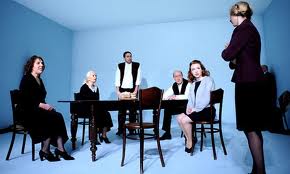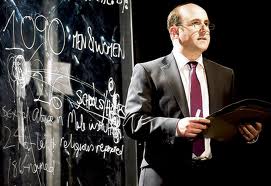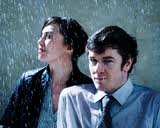For the past few months world news has been dominated by sweeping revolution across the Arab world. It has been incredible to witness the youth of Egypt, Tunisia, Bahrain and most recently Lybia take to the streets in protest and in a unified voice declaring change is both wanted and needed. With these events in mind, it is interesting to note how and where theatre and the arts are responding to these seminal moments of political and social upheaval.
Throughout the Middle East and North Africa despotic regimes have been challenged and toppled by what has popularly become known as ‘Facebook Revolutions’. The disenfranchised and un-institutionalised youth took the stop forward to initiate change. Ideas and debates spread and were disseminated through social networks, beyond regional and national boundaries and it would be a natural reaction that revolution would be born. The key ingredient was information. Now, in the instant wake of these events, it is the reactive agency of theatre that can assess and respond to these seismic social upheavals.
The power of theatre as a tool to astutely capture and represent social shifts is in its immediacy. It can capture the rawness, the tragic and the hope. The role of theatre as a conduit for independent thought and resulting change is not lost on the current crises the world has faced.
Playwrights such as Caryl Churchill penned and saw produced her work Seven Jewish Children in the immediate wake of the 2008-2009 Israel military strike on Gaza. It was first performed at London’s Royal Court Theatre on 6th February 2009. This play was also staged at the Abbey Theatre in Dublin at a free performance in March 2009. The Abbey would again return to the barricades when it staged a season of works to reflect on the national crises of institutional abuse of Irish children. The Darkest Corner was a brave and also disturbing account of the torture these forgotten children endured. An interesting note is the play reflecting on the complex Gaza/Israel issue was staged almost immediately and in time with the conflict. The Darkest Corner would follow a full year after the publication of the report of “the Commission to Enquire into Child Abuse in Ireland”.
The question of timing such plays is tricky. Stage the work too soon and it can lose its focus and become overtly emotionally or politically aligned with a certain cause or side. Stage the work too late and the real immediacy and impact of a work will also be distorted. On the recent RTE documentary series From Stage to Street, Prof. Chris Morash made the point regarding the original staging of the Plough and the Stars at the Abbey Theatre in February 1926: The Plough and the Stars was written and staged ten years after the 1916 Rising and still provoked near riots. It is the equivalent, Morash said, of a play being staged today depicting the firemen of New York in the aftermath of 9/11 acting in a drunken stupor and cavorting with prostitutes in brothels. This incredibly astute observation opens up debate on when indeed are we as a society and audience ready to engage with the fall out of such global events.
This also raises another question. What form, should this ‘Theatre of Protest’ take? Mary Raftery’s No Escape, produced as part of The Darkest Corner series, took the form of ‘verbatim’ or documentary theatre. This form is possibly the purest in content as it is the words, and solely the words, of a particular group or viewpoint, retold verbatim. It is a hugely powerful form of theatre and engages an audience with the primary source rather than news stories or political spin.
Staging works as world events are unfolding does allow a unique viewpoint. Theatres become agents of debate and information but perhaps this is inevitably to the detriment of artistic and dramatic thought and creativity. The normal processes of creativity involve the gestation of an idea, reaction to thought, a play is written, a theatre is found to stage it, an audience witnesses it and reaction begins. Creating a play in reaction to a particular crisis and watching it gel with its cast, see its form change and keep up with world events is a radical departure from the traditional.
Closer to home, can we pinpoint a specific new play or work staged professionally or otherwise in Ireland that adequately tackles the demise of Irish society in the crash of our economic sovereignty? There are few. Fewer works look at the involvement of the Irish in international conflict situations, such as, international peace keeping missions for which they have been highly commended for decades. Works such as Colin Teevan’s How Many Miles to Basra and others that comprised the Bearing Witness series at the Abbey Theatre commemorating the 60th anniversary of the Declaration of Human Rights in December 2008 are excellent and notable exceptions to the lack of debate, pushing the Abbey Theatre once more to the front of reaction to international conflict.
Looking back on March 2008, The Project Arts Centre staged Dennis Kelly’s Love and Money which was a stylish and slick production that examined the high-capitalist, materialist classes emerging in London. At the very precipice of Irish and global financial crisis, the Project Arts Centre was critiquing and commenting on the very greed and fiscal incompetency that set forth to shatter our national sovereignty.
Internationally, works such as Black Watch by the Scottish National Theatre, produced at the 2008 Ulster Bank Dublin Theatre Festival and Tony Kushner’s Homebody read at the Abbey Theatre in March 2003 highlighted the impact and power these reactive works infused on their audiences. Conflict and immediate reaction to conflict has been relevant to the Irish stage and has been more than important and essential to understanding the global consequences of these actions.
Now, in North Africa and the Middle East, revolution has taken the form of Web 2.0.We have witnessed protests on stage. Is it now time for the crisis to be put on stage? This means engaging directly with the event and making a response relevant and which creates debate and understanding. If the highest role of theatre is citizenship then a new ‘Theatre of Crisis’ may be needed to match the experience of its audience. Theatre makers must keep up with the pace of this revolution. The thought, energy and emotions are palpable as the world looks on. If we keep looking without engaging, the real threat is that it can pass us by. The stakes are that high.








